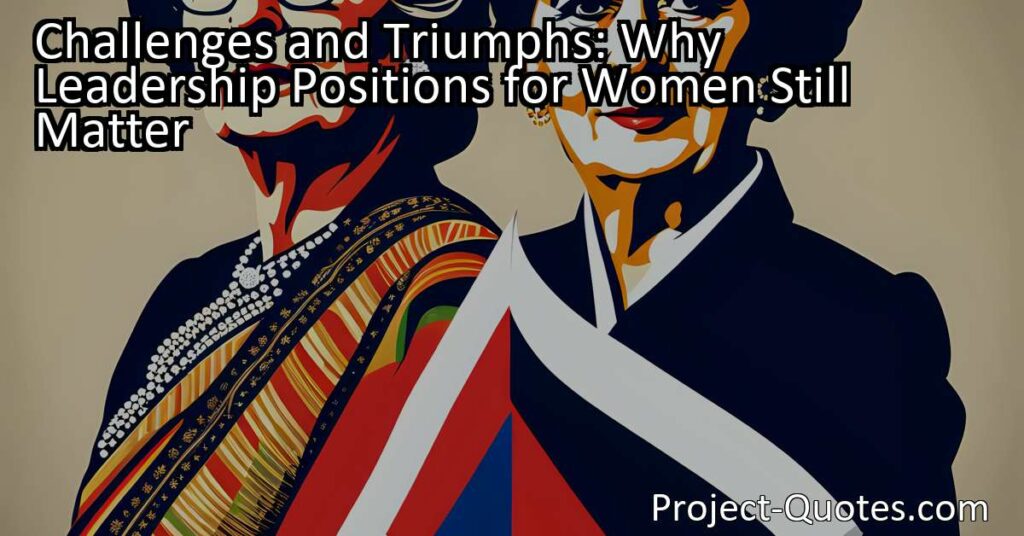They didn’t even like Margaret Thatcher but at least there was Margaret Thatcher. There have been women, you know, Sonia Gandhi for heaven’s sakes in India.
Kate Clinton
Challenges and Triumphs: Why Leadership Positions for Women Still Matter Women in leadership positions still face numerous challenges and barriers worldwide. Despite progress, gender inequality remains deeply ingrained in many societies. Discrimination, stereotypes, and biases hinder women’s progress, but by highlighting their achievements and contributions, we can inspire future generations to pursue positions of power and create a more inclusive and equitable society.
Table of Contents
- 1 They didn’t even like Margaret Thatcher but at least there was Margaret Thatcher. There have been women, you know, Sonia Gandhi for heaven’s sakes in India.
- 2 Kate Clinton
- 3 Meaning of Quote – They didn’t even like Margaret Thatcher but at least there was Margaret Thatcher. There have been women, you know, Sonia Gandhi for heaven’s sakes in India.
- 4 Freely Shareable Quote Image
- 5 Related
Meaning of Quote – They didn’t even like Margaret Thatcher but at least there was Margaret Thatcher. There have been women, you know, Sonia Gandhi for heaven’s sakes in India.
In today’s world, it is not uncommon to hear discussions about the roles of women in positions of power. Many people may have differing opinions on the matter, but one thing is clear – women have made significant strides in politics and leadership. As Kate Clinton, a well-known comedian and political commentator, once said, “They didn’t even like Margaret Thatcher but at least there was Margaret Thatcher.” This quote, although seemingly simple, holds a deeper meaning that highlights the importance of having women in leadership roles, regardless of personal opinions or ideologies.
Margaret Thatcher, former Prime Minister of the United Kingdom, was a controversial figure during her time in office. While her policies and actions may have been divisive, she served as a trailblazer for women in politics. As the first female British Prime Minister, Thatcher shattered the glass ceiling and opened doors for future generations of women to follow in her footsteps. Even those who did not agree with her politics recognized the significance of her presence in a predominantly male-dominated field.
Clinton acknowledges that not everyone may have liked Thatcher, but her existence as a prominent female leader was vital. She emphasizes the importance of representation, regardless of personal preferences. In this context, representation means having individuals from various backgrounds and perspectives in positions of power. When people see individuals who resemble them or share similar experiences leading their country or making important decisions, it instills a sense of hope and possibility within them. This is especially true for marginalized groups, including women, who have historically been underrepresented in leadership positions.
Moving beyond Thatcher’s impact, Clinton reminds us that there have been other influential women in politics. One such example she mentions is Sonia Gandhi, the former President of the Indian National Congress and one of the most powerful politicians in India. Gandhi’s presence in Indian politics has made waves and inspired countless women to pursue their own political aspirations. Her role as a female leader has been instrumental in challenging cultural norms and breaking down barriers for women in India.
However, it is important to note that women in leadership positions still face numerous challenges and barriers worldwide. Despite the progress made over the years, gender inequality remains deeply ingrained in many societies. Women often encounter discrimination, stereotypes, and biases when venturing into domains traditionally reserved for men. These obstacles can hinder their progress and discourage them from pursuing leadership roles.
To combat these challenges, it is crucial to continue highlighting the achievements and contributions of women leaders. By celebrating their successes and acknowledging their impact, we can inspire future generations of young girls and women to chase their dreams and aspire to positions of power. When we look back at history, we see that women have always played significant roles, even if they were often overshadowed or forgotten. By bringing these stories to light, we can create a more inclusive narrative that encourages gender equality.
Moreover, the empowerment of women does not just benefit them; it benefits society as a whole. Research has shown that gender-diverse leadership teams lead to better decision-making and more innovative solutions. When women’s perspectives are included, a wider range of experiences and ideas come to the table, leading to more comprehensive and effective outcomes. This is not to say that women are inherently superior to men in leadership roles, but rather that the inclusion of diverse voices leads to more well-rounded decision-making processes.
In conclusion, Kate Clinton’s quote reminds us of the importance of women in leadership roles. Regardless of personal opinions or ideologies, the presence of women like Margaret Thatcher and Sonia Gandhi has paved the way for future generations of women to step into positions of power. Representation matters, and it is crucial to continue advocating for gender equality in politics and beyond. By doing so, we can create a more inclusive and equitable society where everyone has an equal chance to succeed and make a difference.
I hope this quote inspired image brings you hope and peace. Share it with someone who needs it today!


